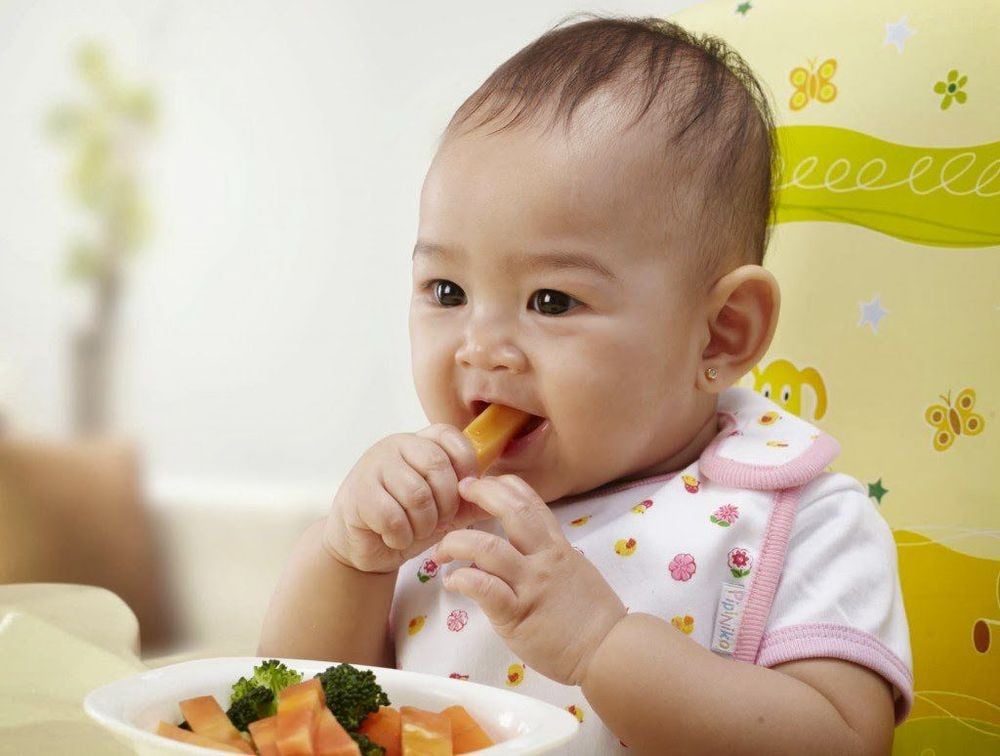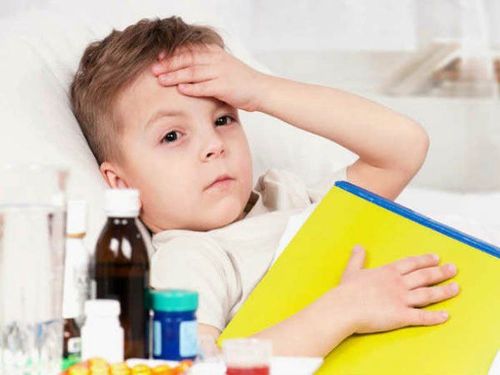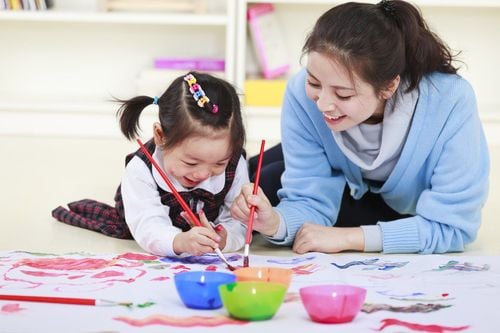This is an automatically translated article.
The article is professionally consulted by Master, Doctor Dang Huy Toan - Department of Pediatrics - Neonatology - Vinmec Nha Trang International General HospitalEntering the 13th month, the baby can walk quite a long distance. At this stage, your child's skills are still developing rapidly, so don't worry if your child is only focusing on improving a few skills. Please encourage children with love, interaction and adequate and reasonable nutrition.
1. Physical development of 13-month-old children
13-month-old babies know how to walk, climb, stand, and walk. Parents need to keep an eye on the child at all times whether he is standing or climbing low steps, even when he is walking. It is best to have a barrier when climbing / descending the stairs to avoid unintended accidents with children.
The motor ability of this 13-month-old baby is developing significantly, so it is difficult for the baby to stay in one place, not like to be locked in a crib, or a stroller. Children want the freedom to move around the house and explore on their own.
For children, getting up means a completely different perspective to explore the world around them, so children are very prone to falling when they constantly stand up and sit down. A study has shown that a baby can fall an average of 38 times a day. You do not need to worry because your baby's bones are very flexible at this time.
Trắc nghiệm: Sự phát triển tinh thần, vận động của bé thế nào là đúng chuẩn?
Khi nào bé biết nói, biết hóng chuyện hay biết cầm cốc là "đúng chuẩn"? Điểm xem bạn biết được bao nhiêu mốc phát triển tinh thần, vận động "đúng chuẩn" của bé nhé!The following content is prepared under supervision of Thạc sĩ, Bác sĩ y khoa, Ma Văn Thấm , Nhi , Phòng khám Đa khoa Quốc tế Vinmec Dương Đông(Phú Quốc)
Do not rush to put on shoes for the child at this time because the bones in the child's feet are still developing their final shape. This can cause a child's feet to grow in the shape of the shoes instead of their natural shape.
At this age, children begin to get interested in tossing things, making a mess, and being able to mess up a room with times you can't imagine. This is part of the child's development. In particular, children show interest in opening, closing, taking out, putting away, throwing.
Mother can guide the baby by picking up the things and putting the toys in the basket, show the child that you clean the toys, the child will learn and imitate your actions.

2. Movement ability of 13-month-old children
Now the child can walk on his own, even walk around the house. Children begin to like to imitate adult actions, such as if you touch their nose, they will do the same.
13-month-olds can say one or two recognizable words and point to what they want. Children also make certain advances in communicating with adults without crying. These are gestures, such as pointing at something or an animal that the child finds interesting.
Most toddlers can pull themselves up and move around the room while clinging to objects around them or even toddlers walk without help or don't like holding hands mom.
Some other children may still be unsteady at this stage. However, parents should not show concern because according to experts, this is completely normal, with 18-month-old babies just starting to stand or even taking their first steps.

3. Cognitive and emotional development in 13-month-old babies
At the age of 13 months, children show signs of slowing down, their weight no longer increases as quickly as in previous months. The motor system in children also has interesting developments. Children do not like mothers or relatives to help them walk, maybe they will push your hand away when you want to lead them even though they are not walking yet.
Children are wanting to do it on their own, no longer having to wait to be picked up and carried away. Children often move to places that make them curious and attracted. Sometimes children feel scared with certain things when they find out such as TV suddenly turning on, loud dog barking...
At this stage, children are discovering cause and effect. Mom will pick up the pacifier if the baby throws it on the ground, so the baby will probably throw it again. Even if the mother may be irritated by having to pick them up dozens of times, babies still have this renewed sense of control over their environment.
However, mothers should note, this is how the baby learns and recognizes the causal cycle, forming the child's future communication process. Children will realize that they can get their mothers or caregivers to do what they want, to meet their needs. Children will form the habit of imitating, or opposing, and gradually create their own communication.
13-month-old children have begun to know how to express sadness and anger if their mother or relatives do not understand them. You may not know it yet, but the truth is that a 13-month-old can know exactly what he wants, where he wants to go, and what he wants to do. At this time, the child's brain is developing very quickly, to keep up with this brain development, the child's body must adapt.
This is also the time when you will see signs of stubbornness and frustration, demanding in your child. People may feel that the child is no longer as lovable as before, the child will become irritable, stubborn and demanding.
Please patiently and gently advise children, children are trying to understand the world around them and look to their parents and family members for guidance, and over time, children will learn and develop feelings own feelings.
13-month-olds can already babble and say a few words like “daddy”...but body language is still their first language.

4. Diet of 13-month-old children
At this stage, when your baby's motor skills have developed, you should start teaching your baby to drink milk from a cup instead of a bottle. Many toddlers become very lazy to eat, and some are not even interested in anything but just drink milk, often enjoying tossing food and trying to feed themselves. However, you should not be too worried, especially absolutely do not force children to eat, create conditions for children to explore and learn, do not turn food into fear of children. These are all part of normal child development. Every child is different and the number on the scale is not the most important thing.
Most toddlers need about 1,000 calories per day. However, it is very impractical to try to count the calories your baby takes in. You cannot expect your child to eat the same sized portions from one meal to another or the same amount of food from day to day. There will be days when you become very anorexic, anorexic and even refuse to eat.
Let the child sit at the table, the child's portion should be about 1/4 of the adult's food. Then, let them be free to choose what they eat and how much they eat based on their own needs.
In addition to 3 main meals, it is necessary to give children more fresh fruits according to their preferences, fruit juices, yogurt... for the child's digestive system to work better. It should be noted when choosing fruits and vegetables for children, must ensure food hygiene and safety to avoid causing diseases for children.
In addition to dairy products, mothers need to supplement calcium for children from foods such as green vegetables, tofu.. because toddlers tend to absorb quite little calcium, iron and fiber.
Encourage children to try foods made from cereals, beef... to add iron. The amount of milk a baby drinks at this stage depends on the amount of calcium in other foods and drinks the baby consumes.
Most 13-month-olds should get about 700 mg of calcium per day. Therefore, babies need about 700ml of milk if they are not getting calcium from any other food source, and you can increase or decrease the amount of milk when introducing baby to solid foods.
To encourage the development of children, parents should note:
It is necessary to ensure the safety of the house around the baby, especially active children, stay away from electrical outlets, sharp objects, hot water plugs ... Each child will develop at his or her own pace. Therefore, parents should not be too worried or alarmed when the child has not reached all of his developmental milestones You need to pay attention to observe and listen to the child, all information and knowledge about child rearing are only approximate. opposite to
In addition, 13-month-old children need 5mg of elemental zinc/day to eat well, reach the correct height and weight and exceed the standard. Zinc plays a role in affecting most biological processes taking place in the body, especially the breakdown of nucleic acids, proteins... Organs in the body when zinc deficiency can lead to a There are a number of diseases such as neurological disorders, irritability, etc. Therefore, parents need to learn about the role of zinc and guide them to appropriate zinc supplements for their children.
In addition to zinc, parents also need to supplement their children with other important vitamins and minerals such as lysine, chromium, B vitamins,... errands.
Please regularly visit Vinmec.com website and update useful information to take care of your baby and family.
References: emmasdiary.co.uk, whattoexpect.com














